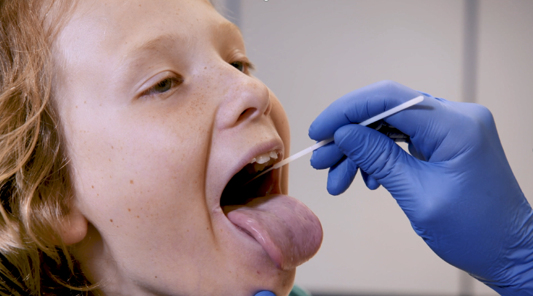Search
Research
Containing Coronavirus Disease 19 (ConCorD-19)Chile has been hard hit by COVID-19, at times reporting around 6500 new cases a day, with many of these located in the capital Santiago.

News & Events
COVID tests well tolerated by WA school kidsA study conducted across 40 WA schools has found COVID-19 testing using a combined nose and throat swab was well tolerated by children as young as 4 years.

News & Events
Minderoo Foundation funds vaccine trial to protect WA healthcare workers from COVID-19At least 2,000 WA healthcare workers will help test whether an existing tuberculosis vaccine can reduce their chance of COVID-19 infection, lessen the severity of symptoms and boost immunity.

News & Events
Community advocate jumps on board with new COVID-19 advisory groupLike many of us, consumer and community advocate Catherine Hughes is worried about the impact of COVID-19. So she joined Australia’s first COVID-19 consumer reference group to be a voice for the community.

News & Events
Rapidly assembled advisory group to offer community take on COVID-19 researchThe speed with which research projects on the coronavirus have been put together has consumer advocates concerned that a vital voice will be missing – that of the community.
Research
Can positive mindsets be protective against stress and isolation experienced during the covid-19 pandemic? A mixed methods approach to understanding emotional health and wellbeing needs of perinatal womenThe aim of this study was to explore the relationship between emotional health and wellbeing and support needs of perinatal women during the COVID-19 pandemic, and to understand their experiences and need for support. This is a potentially vulnerable group and a critical developmental phase for women and infants.
Research
Variation in excess all-cause mortality by age, sex, and province during the first wave of the COVID-19 pandemic in ItalyAlthough previous evidence suggests that the infection fatality rate from COVID-19 varies by age and sex, and that transmission intensity varies geographically within countries, no study has yet explored the age-sex-space distribution of excess mortality associated with the COVID pandemic.
Research
The Mental Health Implications of Domestic Violence During COVID-19Citation: Newnham EA, Chen Y, Gibbs L, Dzidic PL, Guragain B, Balsari S, et al. The Mental Health Implications of Domestic Violence During COVID-19.
Research
Validation of a rapid, saliva-based, and ultra-sensitive SARS-CoV-2 screening system for pandemic-scale infection surveillanceWithout any realistic prospect of comprehensive global vaccine coverage and lasting immunity, control of pandemics such as COVID-19 will require implementation of large-scale, rapid identification and isolation of infectious individuals to limit further transmission. Here, we describe an automated, high-throughput integrated screening platform, incorporating saliva-based loop-mediated isothermal amplification (LAMP) technology, that is designed for population-scale sensitive detection of infectious carriers of SARS-CoV-2 RNA.
Research
Consensus guidelines for the diagnosis and management of invasive aspergillosis, 2021Invasive aspergillosis (IA) in haematology/oncology patients presents as primary infection or breakthrough infection, which can become refractory to antifungal treatment and has a high associated mortality. Other emerging patient risk groups include patients in the intensive care setting with severe respiratory viral infections, including COVID-19.
